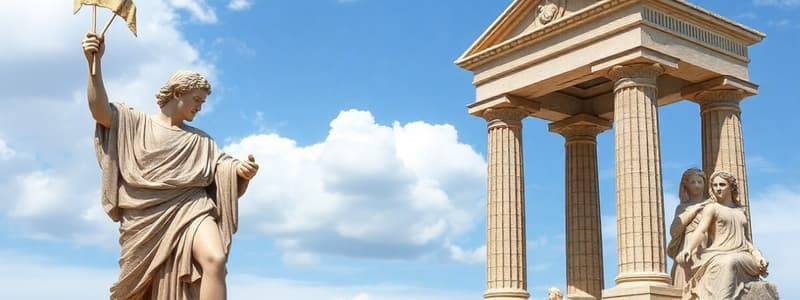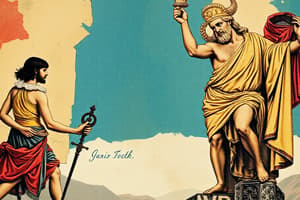Podcast
Questions and Answers
What subjects did the enslaved Greek tutors not teach to young Romans?
What subjects did the enslaved Greek tutors not teach to young Romans?
- Advanced mathematics
- Geometry
- Agriculture (correct)
- Philosophy
Which of the following best describes the Roman approach to the Greek pantheon?
Which of the following best describes the Roman approach to the Greek pantheon?
- They selectively integrated aspects into their own beliefs. (correct)
- They adopted it without modification.
- They completely rejected it.
- They created entirely new gods to replace them.
What was the significance of the Pantheon temple in Rome?
What was the significance of the Pantheon temple in Rome?
- It served as the residence for the Roman Emperor.
- It honored multiple gods and goddesses in one place. (correct)
- It was built to celebrate military victories.
- It was dedicated only to one god.
How did the Greeks typically view cats in comparison to the Romans?
How did the Greeks typically view cats in comparison to the Romans?
Which of the following deities was mentioned as standing beside a cat in ancient Rome?
Which of the following deities was mentioned as standing beside a cat in ancient Rome?
What cultural practice involving cats did the Egyptians have that Greeks did not?
What cultural practice involving cats did the Egyptians have that Greeks did not?
When were domestic cats likely introduced to Italy?
When were domestic cats likely introduced to Italy?
Which aspect of religion notably differed between Greeks and Romans?
Which aspect of religion notably differed between Greeks and Romans?
What was a significant impact of Greece on Roman religion?
What was a significant impact of Greece on Roman religion?
Which Roman god corresponds to the Greek god Poseidon?
Which Roman god corresponds to the Greek god Poseidon?
How did Roman aristocrats integrate Greek culture after conquering Greece?
How did Roman aristocrats integrate Greek culture after conquering Greece?
What philosophy did the Romans adopt regarding Greek culture?
What philosophy did the Romans adopt regarding Greek culture?
Which Roman god is identified as the equivalent of the Greek god Cronus?
Which Roman god is identified as the equivalent of the Greek god Cronus?
What indicates the Romans' approach towards the Greek pantheon?
What indicates the Romans' approach towards the Greek pantheon?
What was Tertullian's view regarding statues and images in the context of spirituality?
What was Tertullian's view regarding statues and images in the context of spirituality?
How did the philosophy and intellect of ancient Greece impact Rome?
How did the philosophy and intellect of ancient Greece impact Rome?
Flashcards
Borrowed Gods of Rome
Borrowed Gods of Rome
Roman gods were largely based on Greek counterparts, adapted and integrated into Roman culture.
Greek Influence on Roman Culture
Greek Influence on Roman Culture
Greek philosophy, politics, and intellect significantly shaped Roman society, particularly after the establishment of Rome's empire in the Mediterranean region.
Roman Pantheon
Roman Pantheon
The collection of gods and goddesses that Rome adopted, predominantly Greek but with Roman adaptations.
Cultural Exchange (Greece & Rome)
Cultural Exchange (Greece & Rome)
Signup and view all the flashcards
Jupiter
Jupiter
Signup and view all the flashcards
Neptune
Neptune
Signup and view all the flashcards
Saturn
Saturn
Signup and view all the flashcards
Roman Adaptation of Greek Ideas
Roman Adaptation of Greek Ideas
Signup and view all the flashcards
Roman Adoption of Greek Gods
Roman Adoption of Greek Gods
Signup and view all the flashcards
Roman Pantheon
Roman Pantheon
Signup and view all the flashcards
Bastet (Roman Context)
Bastet (Roman Context)
Signup and view all the flashcards
Greek vs. Roman Cat Attitudes
Greek vs. Roman Cat Attitudes
Signup and view all the flashcards
Roman Cat as Helper
Roman Cat as Helper
Signup and view all the flashcards
Roman Domestic Cats
Roman Domestic Cats
Signup and view all the flashcards
Greek Tutors in Rome
Greek Tutors in Rome
Signup and view all the flashcards
Greek Influence on Roman Learning
Greek Influence on Roman Learning
Signup and view all the flashcards
Study Notes
Chapter 15 - The Borrowed Gods of Rome
- Roman refusal to worship statues is viewed as a rejection of error, not a penalty.
- Nonexistent entities are secure from suffering.
Hellenistic Influence on Rome
- Hellenistic kingdoms predated Rome by centuries.
- Athens was a center of philosophy, politics, and intellect for the Mediterranean.
- Greek culture spread to Rome, adapting to the Roman context.
- Rome respected the Greek civilization that came before it.
Roman Pantheon and Greek Gods
- Roman gods are similar to Greek gods.
- Roman gods are almost identical to Greek gods in form with different names.
- Examples: Jupiter (Zeus), Neptune (Poseidon), Saturn (Cronus).
- Roman deities are comparable to Greek counterparts, showing respect for Greek civilization.
- Romans adopted and adapted Greek philosophies to make them their own.
Roman Adoption of Greek Culture
- Romans conquered much of the Mediterranean.
- Learned Greeks were brought to Rome to teach Roman children.
- This ensured continued Greek cultural knowledge.
- Roman children were educated on Greek mythology, gods, etc.
- Romans adopted the best aspects of Greek civilization for their own benefit.
Roman Religious Beliefs
- Romans adopted Greek gods, but chose aspects of their faith at will.
- Egyptian goddess Bastet was integrated into Roman households.
- Cats were not as significant in Greek culture.
- Cats were important to Roman households as house pets.
- Phoenicians likely brought cats to Italy, making them beloved house pets.
Cultural Exchange and Continuity
- Greek and Roman cultures existed in close proximity, allowing for knowledge and cultural exchange.
- Roman gods mirrored Greek equivalents, but Rome still had its own unique characteristics.
- Greeks and Romans both valued their traditions and cultures.
- Greek civilization influenced and inspired the Roman republic.
Studying That Suits You
Use AI to generate personalized quizzes and flashcards to suit your learning preferences.




